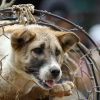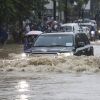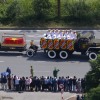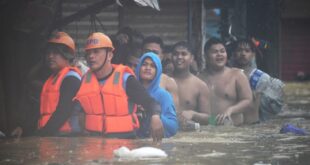The government’s decision to have arrivals from Omicron-hit countries undergo centralized quarantine is not a good move, several experts say, citing cost burden and cross-infection risks.
On Monday, Hanoi announced its decision to have all visitors from countries and territories where the Omicron variant of the coronavirus has been detected placed in centralized quarantine regardless of their vaccination or recovery status.
Earlier, Ho Chi Minh City had also mandated that this particular group must undergo centralized quarantine for seven days.
Dinh Viet Thang, head of the Civil Aviation Authority of Vietnam (CAAV), said Tuesday that these decisions are not in alignment with guidelines given by the Ministry of Health and announcements from the CAAV to its global partners.
For such a decision to be implemented, the CAAV would need to discuss it with all countries and territories in question, as well as with Hanoi authorities regarding the specifics of their plans for centralized quarantine, including locations and procedures. That would impact the government’s plan to resume international flights to Hanoi as previously announced, he said.
The CAAV said all nine countries and territories to which Vietnam was set to resume flights in its first phase of a reopening plan have detected Omicron infections. This means the new quarantine regulations would impact all international flights planned for the coming days.
So far, negotiations for flight resumption have been completed with five countries and territories: Cambodia, Japan, Singapore, Taipei, and the U.S. Thang said final responses are awaited from China, Laos, South Korea and Thailand.
Bui Doan Ne, deputy head of the Vietnam Aviation Business Association, said Vietnamese abroad are likely to either postpone plans to return to Vietnam or seek alternative routes, while foreign tourists would opt to travel to other countries if the new quarantine regulations were enforced.
“The government is trying to welcome people back home to celebrate Tet (Lunar New Year festival), but also wants them to spend seven days in centralized quarantine. Very few people who want to return (in such circumstances),” Ne said.
Cities should instead create opportunities for arrivals to enter in accordance with recent government guidelines on living safety with the virus, Ne argued. Those who are fully vaccinated and test negative for the coronavirus should not have to undergo centralized quarantine, which would only cause discomfort, increase costs, risk cross-infection and overload facilities, he added.
Previously, the health ministry had announced that arrivals who are either fully vaccinated or have recovered from Covid-19 would only need to spend three days in home quarantine, starting from January 1. Hanoi and HCMC should not go against the policy, Ne stressed.
He also said that since the Omicron variant has already appeared in over 100 countries, mandatory centralized quarantine in major cities with important airports would impact plans to resume international flights to multiple destinations, slowing economic development and travel plans.
“The presence of the Omicron variant means heavier responsibilities for localities to prevent infection. But current regulations by the health ministry are already enough, and localities should not introduce more policies,” Ne said.
Not appropriate
Nguyen Huy Nga, former head of the General Department of Preventive Medicine, said the latest centralized quarantine policies are not appropriate, and localities should abide by policies issued by the health ministry for the sake of consistency across the country.
“The Omicron variant has been recognized as having higher transmissibility, but doesn’t cause severe symptoms.”
He also said that the health ministry’s policies for quarantining arrivals already exist, so localities should work with the ministry before implementing their own centralized quarantine mandates.
In the past, Hanoi had once decided not to receive visitors from HCMC over coronavirus concerns, prompting residents of the latter to travel to other localities first and proceed to the capital city next. A similar decision now would only create new troubles in traveling, which should not happen during the “new normal” period, Nga said.
An airline representative who did not want to be named went further, saying Hanoi and HCMC’s decisions amounted to abuse of power as they were not in alignment with the country’s current stance on fighting the coronavirus.
The Tet holiday means a high demand for Vietnamese people overseas to go back home. The higher travel costs, along with the cost of a seven-day centralized quarantine in designted hotels would be the final straw that will break their decision to return home, the rep said.
As the initial phase of international flight resumption would only involve low-frequency flights, localities would be well-equipped to manage the number of visitors in home quarantine, instead of quarantine camps that are much more costly, the rep added.
Omicron, first identified in late November, had raised fresh alarms over its high number of mutations and higher transmissibility.
The new variant has been identified in over 100 countries and territories, including several in the Asia-Pacific region, like Australia, Japan, South Korea, Singapore, Malaysia and India, according to the WHO.
Vietnam confirmed its first Omicron case on December 28, a person arriving in Hanoi from the U.K. on December 19 and currently quarantined at the capital city’s 108 Military Hospital.
There were 165 people sharing the flight, including 162 in Hanoi, and they have all been quarantined and being monitored closely.
- Reduce Hair Loss with PURA D’OR Gold Label Shampoo
- Castor Oil Has Made a “Huge” Difference With Hair and Brow Growth
- Excessive hair loss in men: Signs of illness that cannot be subjective
- Dịch Vụ SEO Website ở Los Angeles, CA: đưa trang web doanh nghiệp bạn lên top Google
- Nails Salon Sierra Madre
 VnExpress News The News Gateway of Vietnam
VnExpress News The News Gateway of Vietnam





